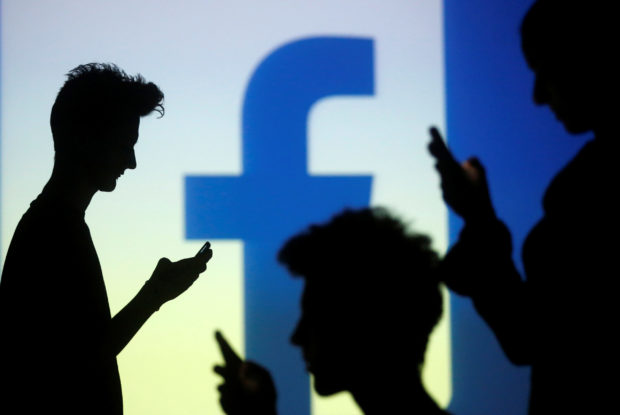Meta vows to forbid misinformation concerning PH polls but also says it’s not arbiter of truth

FILE PHOTO: People are silhouetted as they pose with mobile devices in front of a screen projected with a Facebook logo, in this picture illustration taken in Zenica October 29, 2014. REUTERS/Dado Ruvic
MANILA, Philippines — While Meta has maintained that it would not tolerate misinformation towards the electoral process of countries including the Philippines, it clarified that it would not remove all information as it is not an arbiter of truth.
During a briefing, Alice Budisatrijo of Meta’s Product Policy team explained that they would not allow misinformation about details concerning the elections — like wrong polling dates, misleading information on what materials are needed, and who can vote.
Similarly, Meta — which oversees the operations of social media giants Facebook and Instagram — would not allow offers to either sell or buy votes.
“So a few things that may be removed under this policy: first is misinformation about the dates, locations, times, method of voting or voting registration, who’s qualified to vote, whether a vote will be counted, and what information or materials must be provided in order to vote, and whether a candidate is running or not,” Budisatrijo told Manila-based reporters on Thursday.
“We also don’t allow offers to buy or sell votes when posted on Facebook, statements that aggregate or provide instructions or show explicit intent to illegally participate in the voting process,” she added.
But before she said this, Budisatrijo clarified that she has been asked a lot as to why Meta does not remove all of the information considered inaccurate by some — to which the answer is that they cannot be an arbiter of what is true and not.
“First and foremost, this is a question that I get a lot: why don’t we remove all disinformation, so first is because as a private company, we should not be the arbiter of truth, and we don’t think that any single actor should be. And if we require people to only post the truth on Facebook, then we would have to know all the truth in the world which is basically impossible,” she explained.
“And also not all information is strictly true or false, there can be degrees of truth and opinions on what is true, and so that’s why we believe that by giving more information from the actual experts on fact-checking, we actually serve to educate people about various information,” she added.
Still, Meta would not allow misinformation based on three categories — those that can incite or result in harm, deepfakes or manipulated videos, and voter suppression.
“Having said that, there are some misinformation that we do not allow on the platforms, and these are the three big buckets: misinformation that risks imminent physical harm or violence, we don’t allow in our platforms and to enforce this policy we work with local partners in the world including in the Philippines,” Budisatrijo said.
“So when a local partner tells us that the target of the misinformation is particularly vulnerable, or there is some historical context or precedent that should tell us that a particular claim could lead to or incite violence, then we would remove that content,” she added.
In terms of Philippine politics, Facebook in the past has already removed several accounts that have posted content favoring some candidates and are critical of the present political opposition, including networks belonging to President Rodrigo Duterte’s former social media manager and the country’s uniformed service.
READ: Over 100 fake accounts traced to PH police, military shut down by Facebook
However, the social media company maintained that suspension or deletion of pages and accounts from the platform was never about the content, but because of a coordinated inauthentic behavior or a network of accounts pretending to be independent but are actually managed to generate artificial support for a specific cause or campaign.
READ: Facebook warns those making fake accounts: We’ll keep taking you down
READ: Takedown of accounts not related to content – Facebook exec
With the May elections in the Philippines fast approaching, many observers have raised concerns over the possible proliferation of misleading information on social media sites including Facebook and Instagram.
Several educators have volunteered to start fact-checking misinformation, disinformation, and revisionist takes on social media to ensure that the upcoming elections would empower the people to make the right choices.
READ: Educators to fact-check candidates and supporters, flag revisionists
READ: Comelec spokesman: Misleading statements sometimes part of campaign